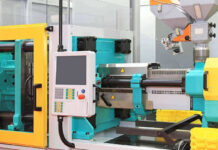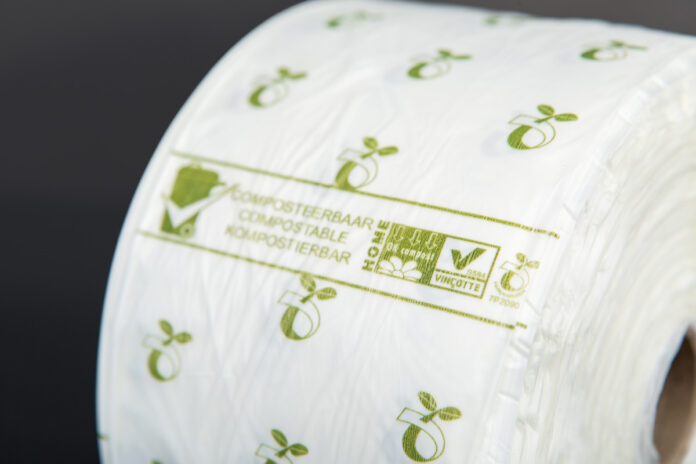
Today I want to shine some light on trash bags and what they are doing to our environment. The problem is that most people don’t think about what happens to their trash once it’s left their house.
And I understand why; the thing is it’s more important than ever to start thinking about it. We are about to reach a point of irreversible damage if we don’t.
Below I’m going to explain why it’s not just your trash that needs to be biodegradable… it’s the bags you use too!
The Problems With Trash Bags

When it comes down to it, there is one major problem with trash bags: they don’t biodegrade at all. And this fact is causing a massive problem for our waste system.
Let me explain:
In America alone, we generate over 250 million tons of trash each year, which is more than anywhere else in the world. Out of that, nearly 3.5 million tons is plastic waste, which will never biodegrade.
What makes it worse is the bags we use to hold our trash also get made with plastic. And this is a problem, even if the only waste inside the trash bag is biodegradable.
For anything to biodegrade, you need three things:
- Sunlight
- Moisture
- Oxygen
Without these three things, it’s unlikely that your trash will ever biodegrade. As you can imagine, anything inside these plastic trash bags will not receive the conditions it needs to break down.
This is only made worse when they get sent to a landfill site. The problem is when the trash bags get piled on top of each other. It locks the trash bags away from everything that gives them a fighting chance of breaking down.
There’s one more problem with traditional trash bags I want to bring up.
Plastic trash bags contain a lot of harmful chemicals inside, and over time these chemicals can start leaching into the soil over extended periods.
And it only gets worse when it rains; the rain helps wash all the harmful chemicals into our water sources.
So, what can we do to make the situation better?
Our best option is to start using biodegradable/compostable trash bags, which you can find out a bit more here.
What Properties Must An Eco-Friendly Trash Bag Have?
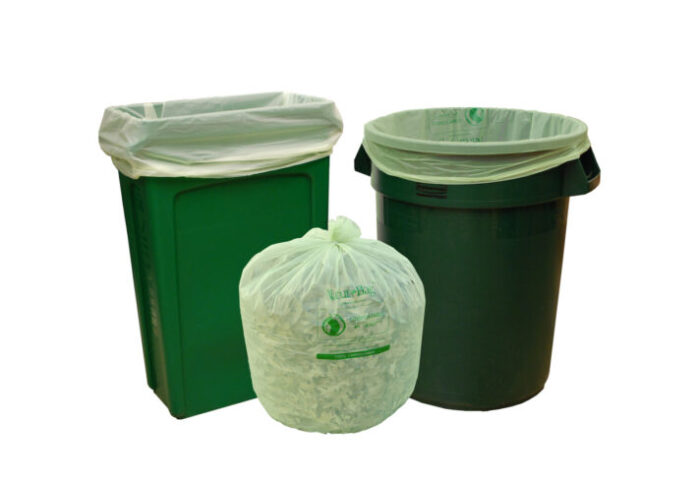
For a trash bag to get classed as eco-friendly, it needs to hold up to a few standards. The first of which is that it needs to be compostable or, at the very least biodegradable.
Compostable
The best is compostable bags; biodegradable bags aren’t always as eco-friendly as you think. Some biodegradable bags use petrochemicals to make the bags; This makes them no better than traditional plastic bags.
Compostable trash bags get made with plant-based products, cornstarch and potato starch, which means no harmful toxins get used.
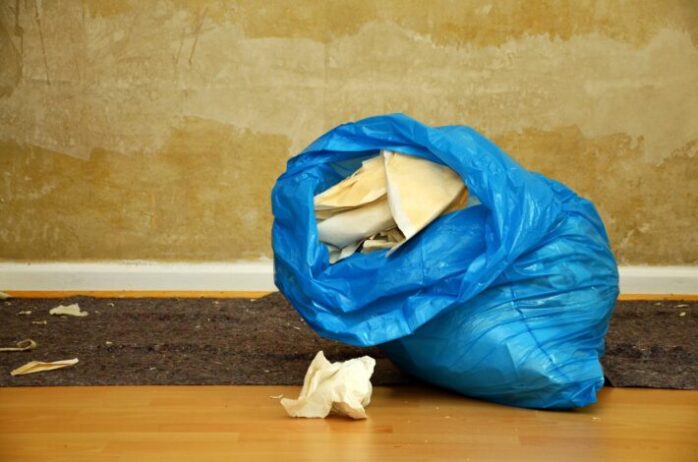
Chemical Free
BPA is found in most plastic products, which, as you can imagine, isn’t doing the environment any good. But what people might not know is what it’s doing to our bodies.
BPA has been proven to cause the following health problems:
- Cancer
- Infertility
- Congenital disabilities
- Heart disease
By choosing a compostable bag, you ensure there is no BPA inside. If you want to ensure your bag is eco-friendly, you need to make sure the bags contain no harmful chemicals.
ASTM Rating
The only way to know if your trash bags are compostable is by looking for an ASTM D6400 rating. ASTM is an American standards organization that judges the quality of the product.
Recommended Trash Bags & Why
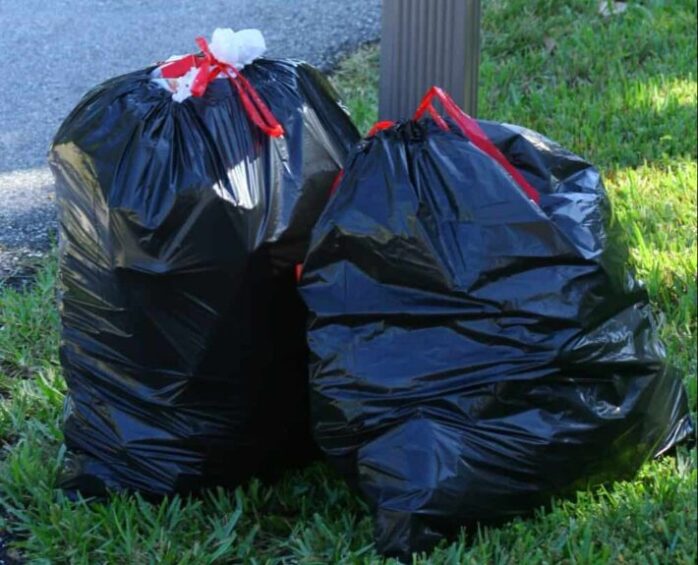
If you’re looking for biodegradable trash bags, but you’re not sure where to start, there’s no need to worry. I’ve done the research, so you don’t have to. There seems to three brands that outperform the rest:
UNNI ASTM D6400
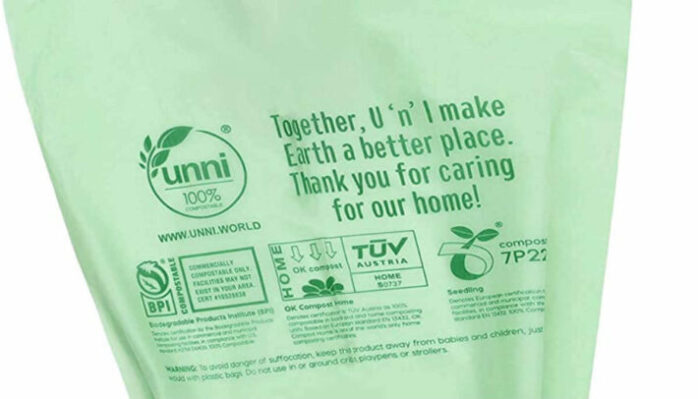
They provide a great selection of sizes for you to choose from, which means you can find ones to fit any size of the dustbin.
The packs start with a count of 50 and go up to 200 bags per box. They have a great thickness, so you don’t have to worry about the bag splitting if it’s too heavy.
But most importantly, they guarantee to be compostable with their ASTM D6400 rating. This is because the bags get made with plant starches.
Inwaysin 13 Gallon
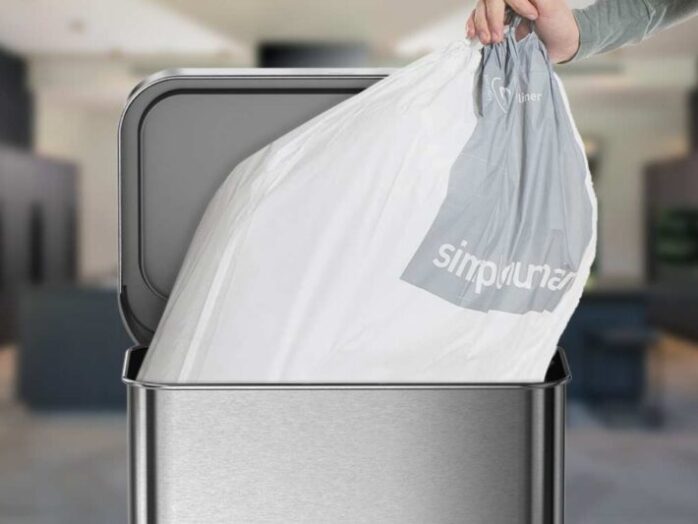
These bags will fit a 13-15 gallon dustbin (24.8 inches x 31.5 inches), which is excellent for your kitchen. They use plant starch to produce the bags, which is fully compostable.
This trash bag is one of the thickest compostable bags on the market at just over 1.18 mm; this makes the trash bags incredibly durable compared to other brands.
Each roll comes with 75 biodegradable bin bags, so you don’t have to worry about running out too quickly. The bags are also odorless, so it doesn’t harm humans or the environment.
Primode 13 Gallon

Their compostable bags fit in tall bins due to their large size of 23.8 inches x 29.4 inches), this makes it great for use in the kitchen.
You get 50 trash bags in the pack, each one is just under 1 mm thick. This makes them thinner than the previous brands, but thankfully they are just as strong.
The company uses a blend of corn and vegetable plastics to ensure it composts in a reasonable amount of time.
Rounding Up
If we want to stop the trash problem reaching a point of no return, then it’s time to start thinking about what we’re doing with our trash.
As a nation, we generate more trash than anywhere else in the world, which needs to stop. By thinking about what we chuck away and how we get rid of it, we can improve our landfills.
An excellent place for us to start is by using biodegradable trash bags, at least it gives biodegradable waste a chance of decomposing. Remember, It’s not just the trash that needs to be biodegradable… it’s the bags too!






